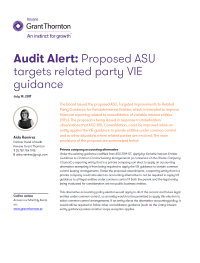-
Financial statements audits
Financial statement audits
-
Compliance audits
Compliance audits
-
Compilations and reviews
Compilations and audit
-
Agreed-upon procedures
Agreed-upon procedures
-
Corporate and business tax
Our trusted teams can prepare corporate tax files and ruling requests, support you with deferrals, accounting procedures and legitimate tax benefits.
-
International tax
Our teams have in-depth knowledge of the relationship between domestic and international tax laws.
-
Tax compliance
Business Tax
-
Individual taxes
Individual taxes
-
Estate and succession planning
Estate and succession planning
-
Global mobility services
Through our global organisation of member firms, we support both companies and individuals, providing insightful solutions to minimise the tax burden for both parties.
-
Sales and use tax and indirect taxes
SUT/ VAT & indirect taxes
-
Tax incentives program
Tax incentives program
-
Transfer Pricing Study
The laws surrounding transfer pricing are becoming ever more complex, as tax affairs of multinational companies are facing scrutiny from media, regulators and the public
-
Business consulting
Our business consulting services can help you improve your operational performance and productivity, adding value throughout your growth life cycle.
-
Forensic and investigative services
At Grant Thornton, we have a wealth of knowledge in forensic services and can support you with issues such as dispute resolution, fraud and insurance claims.
-
Fraud and investigations
The commercial landscape is changing fast. An ever more regulated environment means organizations today must adopt stringent governance and compliance processes. As business has become global, organizations need to adapt to deal with multi-jurisdictional investigations, litigation, and dispute resolution, address the threat of cyber-attack and at the same time protect the organization’s value.
-
Dispute resolutions
Our independent experts are experienced in advising on civil and criminal matters involving contract breaches, partnership disputes, auditor negligence, shareholder disputes and company valuations, disputes for corporates, the public sector and individuals. We act in all forms of dispute resolution, including litigation, arbitration, and mediation.
-
Business risk services
We can help you identify, understand and manage potential risks to safeguard your business and comply with regulatory requirements.
-
Internal audit
We work with our clients to assess their corporate level risk, identify areas of greatest risk and develop appropriate work plans and audit programs to mitigate these risks.
-
Service organization reports
As a service organization, you know how important it is to produce a report for your customers and their auditors that instills confidence and enhances their trust in your services. Grant Thornton Advisory professionals can help you determine which report(s) will satisfy your customers’ needs and provide relevant information to your customers and customers’ auditors that will be a business benefit to you.
-
Transaction advisory services
Transactions are significant events in the life of a business – a successful deal that can have a lasting impact on the future shape of the organizations involved. Because the stakes are high for both buyers and sellers, experience, determination and pragmatism are required to bring deals safely through to conclusion.
-
Mergers and acquisitions
Globalization and company growth ambitions are driving an increase in M&A activity worldwide as businesses look to establish a footprint in countries beyond their own. Even within their own regions, many businesses feel the pressure to acquire in order to establish a strategic presence in new markets, such as those being created by rapid technological innovation.
-
Valuations
We can support you throughout the transaction process – helping achieve the best possible outcome at the point of the transaction and in the longer term.
-
Recovery and reorganization
We provide a wide range of services to recovery and reorganisation professionals, companies and their stakeholders.
The Board issued the proposed ASU, Targeted Improvements to Related Party Guidance for Variable Interest Entities, which is intended to improve financial reporting related to consolidation of variable interest entities (VIEs). The proposal is being issued in response to stakeholders’ observations that ASC 810, Consolidation, could be improved when an entity applies the VIE guidance to private entities under common control and to other situations where related parties are involved. The main provisions of the proposal are summarized below.
Private company accounting alternative
Under the existing guidance codified from ASU 2014-07, Applying Variable Interest Entities Guidance to Common Control Leasing Arrangements (a consensus of the Private Company Council), a reporting entity that is a private company can elect to apply an accounting alternative exempting it from being required to apply the VIE guidance to certain common control leasing arrangements. Under the proposed amendments, a reporting entity that is a private company could also elect an accounting alternative to not be required to apply VIE guidance to all legal entities under common control if both the parent and the legal entity being evaluated for consideration are not public business entities.
This alternative accounting policy election would apply to all of the current and future legal entities under common control, so an entity would not be permitted to apply this election to select common control arrangements. If an entity elects the alternative accounting policy, it would still be required to follow other consolidation guidance (such as the voting interest entity guidance) unless another scope exception applies.
Further, if an entity elects the alternative accounting policy, it would be required to provide certain disclosures about its involvement with and its exposure to the legal entity that is under common control.
Decision-making fees
Under the existing guidance related to determining whether fees paid to decision makers and to service providers are variable interests, indirect interests held through related parties in common control arrangements are considered as a direct interest in their entirety. Under the proposal, these indirect interests would only be considered on a proportional basis, consistent with how indirect interests held through related parties not under common control are considered when determining whether a reporting entity must consolidate a VIE.
Under the proposal, if, for example, a decision maker or a service provider owns a 20% interest in a related party under common control and that related party owns a 40% interest in the legal entity being evaluated, the direct interest in the VIE held through the related party under common control would be considered only an 8% direct interest (instead of a 40% direct interest under the existing guidance) for determining whether its fees are variable interests.
VIE related party guidance
Existing guidance requires that when power is shared among related parties or when related parties under common control, as a group, have the characteristics of a controlling financial interest (but no reporting entity individually has a controlling financial interest), the party within the related party group that is most closely associated with the VIE is the primary beneficiary of the VIE.
The proposal would instead require that if substantially all of the VIE’s activities either involve or are conducted on behalf of one party within the related party group, that party would be the primary beneficiary of the VIE. However, when substantially all of the activities of the VIE do not involve and are not performed on behalf of any single entity in the related party group, the proposal would require the reporting entity to consider whether it has a controlling financial interest in the VIE by considering certain factors (none of which are individually determinative) that indicate whether the reporting entity should attribute decision making to itself.
The proposed guidance also states that after considering those factors, situations may exist in which no single party in a shared power arrangement or within a related party group may conclude that it has a controlling financial interest in the VIE. When related parties under common control, as a group, have a controlling financial interest in a VIE, the parent entity would consolidate the VIE unless a scope exception applies, regardless of the conclusions reached by the individual related parties that are under the parent’s control.
Effective date, transition and comment period
The Board will set the effective date for the proposed amendments when it considers feedback on the proposal. Early adoption would be permitted.
Entities that have not adopted the amendments in ASU 2015-02, Amendments to the Consolidation Analysis, would be required to adopt the amendments in the proposal at the same time they adopt ASU 2015-02, and would apply the same transition method elected for ASU 2015-02.
Entities that have already adopted ASU 2015-02 would be required to apply the amendments in the proposal retrospectively by restating all prior periods presented.
Comments on the proposal are due Sept. 5.
Source: Grant Thornton, On the Horizon, June 29, 2017.
We are committed to keep you updated of all developments that may affect the way you do business in Puerto Rico. Please contact us for further assistance in relation to this or any other matter.


